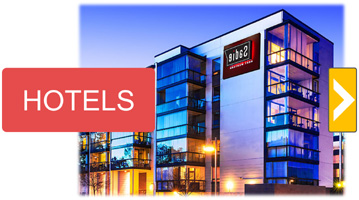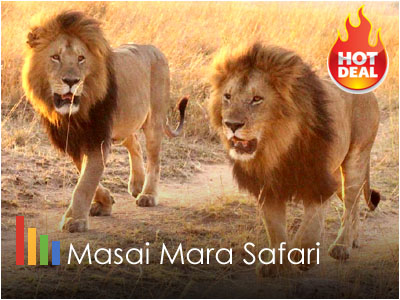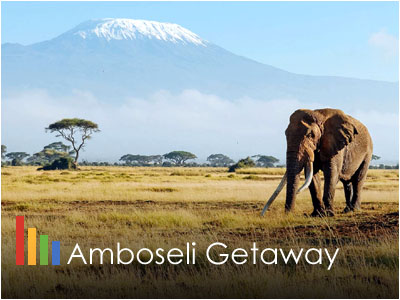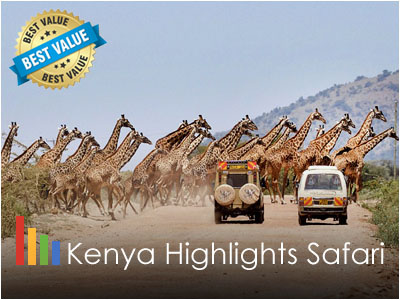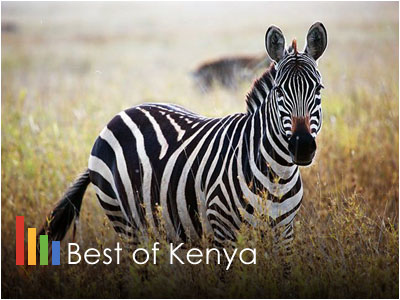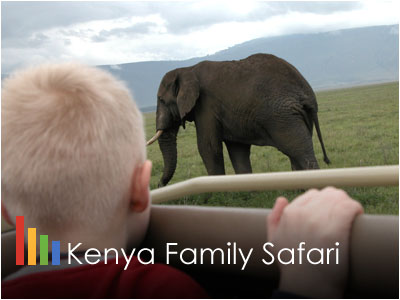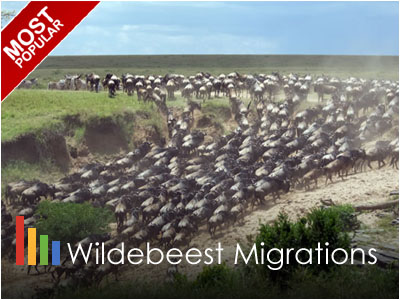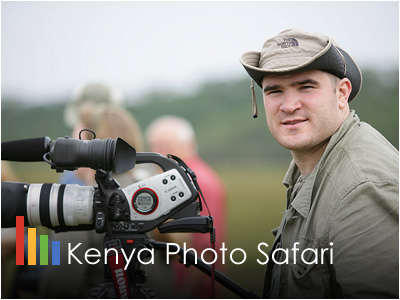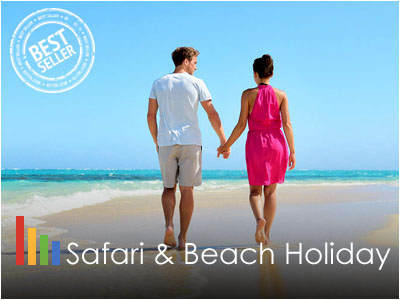Mount Kenya National Park, Kenya, Africa
Mount Kenya National Park - Kenya, Africa
Rising to 5,199 meters, Mount Kenya is the tallest mountain in Kenya and the second tallest in Africa. The scenery surrounding this designated World Heritage Site is breath-taking. It is pristine wilderness with lakes, tarns, glaciers, dense forest, mineral springs and a selection of rare and endangered species of animals, high altitude adapted plains game and unique montane and alpine vegetation. Visitors can enjoy mountain climbing, camping and caving with the mountain’s rugged glacier-clad peaks providing the perfect backdrop. Mount Kenya is the country's highest mountain. Straddling the equator, it's icy summit reaches to 5,199 m above sea level. The National Park consists of all areas above 3,200 m. The mountain actually consists of three distinct zones: the volcanic peak zone, with its endless glaciers and snowlfields; the alpine zone, with its distinctive giant vegetation such as groundsels; and the lower slopes, with their thick forest and bamboo vegetation.
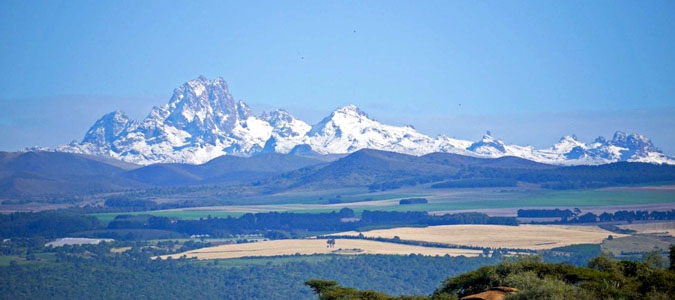
Basic Facts - Mount Kenya National Park
Mount Kenya measures approximately 580 sq kms. It is located in central Kenya and straddles the equator, 193 kms north-east of Nairobi and 480 kms from the Kenya coast at an altitude of 1,600-5,199 m above sea level. Special Features include several mountain peaks with isolated glaciers. The highest peaks are Batian, 5,199m, and Nelion, 5,188m. There are about 20 glacial tarns (small lakes) and numerous glacial moraine features. Vegetation features a rich alpine and sub-alpine flora with montane and bamboo forests, moorlands, and tundra. Between 3,800 and 4,500m many bizarre species flourish, notably giant rosette plants of which 13 species are endemic to Mount Kenya. In the lower forest and bamboo zone there are giant forest hog, tree hyrax, white-tailed mongoose, elephant, black rhino, suni, duiker, and leopard. Moorland mammals include the Mount Kenya mouse shrew, hyrax, and duiker. At higher altitudes the endemic mole-rat is common and there have been rare sightings of the golden cat.
More About Mount Kenya National Park
Mount Kenya has always attracted curious hikers and adventurers, including the turn of the century British geographer/explorer Halford Mackinder. To most modern day adventurers, climbing to the peak of Mount Kenya is still a challenge requiring extensive mountain climbing skills. Nevertheless, most visitors are able to reach the more accessible Point Lenana at 4,985 m and many visitors enjoy simple high altitude walks. Wildlife below the Park boundery include elephant, buffalo, antelope, lion and the rare bongo, also found in the nearby Aberdares. Most wildlife can be viewed from Mountain Lodge on the south side of the mountain. The best times for visiting Mount Kenya and the National Park are January and February and late August through September. Other major attractions include pristine wilderness, lakes, tarns, glaciers and peaks of great beauty, geological variety, forest, mineral springs, rare and endangered species of animals, High altitude adapted plains game, Unique montane and alpine vegetation with 11 species of endemic plants.
Access to Mount Kenya National Park is by three routes: the Naro Moru Route; the Chogoria Route; and the Sirimon Route. The Naro Moru route is from the western slopes of the mountain, beginning in the small town of Naro Moru on the A2 Muranga - Nanyuki road. This route is very steep, and porters can be arranged at the Mount Kenya Guides and Porters Association Headquarters between Naro Moru and the Mount Kenya Youth Hostel. The Chogoria route begins near the small town by the same name, 2 kms to the west of the B6 Embu - Meru road, about 150 kms north of Nairobi. From Chogoria town, you must travel 6 kms to the forest gate and from the forest gate, a further 23 kms to the Park gate. The thick forest on the route to the Park gate are home to antelope and elephants, making this approach to the Park interesting for game enthusiasts. Finally, the Sirimon route begins near the small town of Timau on the A2 Nanyuki - Isiolo road north of the mountain. The road to the Park gate leaves the main road 1 km from the bridge over the Sirimon River. This is the least used access point to the park because of the rough and hilly terrain it must pass through. For more information regarding visits and tours, DO NOT hesitate to Contact Us.
Accomodation in and around Mount Kenya include the following: the Mount Kenya Safari Club with 230 beds; the Outspan Hotel with 74 beds; the Meru County Hotel with 98 beds; the Mountain Lodge with 86 beds; the Naro Moru River Lodge with 129 beds; and the Izaak Walton Inn in Embu with 84 beds. The nearbly Sweetwaters Tented Camp in the Sweetwaters Game Reserve is another option for accommodation. There are many camping options in and around the Park that include Kinondoni Campsite, Mintos Hut & Campsite, Narumoru Gate Campsite, Met Station Campsite, Mackinders Campsite, Austrian Hut Campsite, Sirimon Gate Campsite, Judmaier Campsite, Shipton Campsite, Liki North Hut 7 Campsite, Solo Campsite and Major Campsite. Along the Naro Moru Route, there is the Naro Moru River Lodge Campsite, the Mountain Lodge Campsite, the Mount Kenya Youth Hostel and Park Gate Camp ground, the Met Station Campground at 3,050 m and Mackinder's Camp at 4,200 m. Along the Chogoria route, options include: the Urumandi Campsite; the Roadhead Campsite at 3,300 m; the Parklands Campsite (near the Park gate); and Minto's Hut at 4,290 m. Finally along the Sirimon route, camping areas include: the Park Gate Campsite (at the entrance); the Roadhead Campsite at 3,350 m; the Shipton's Cave Campsite at 4,100 m; and Kami Hut at 4,430 m.
All visitors should enter the park with a qualified and certified guide. Guides and potters have identification cards issued by the park management. Disposable plastic water bottles are not allowed in the park. Guides and potters are not allowed to carry luggage that exceed 25KG. Weighing of luggage will be done at the gate on entry. All visitors are required to check in and out of the park, this is done by recording personal information in the entry and exit books.
AfriChoice operates a wide range of carefully designed tours and safaris to Mount Kenya National Park by providing transport and booking a hotel for you. Our safari consultants will always be at your assistance should you need a tailor-made holiday to this unique destination. NB: For more information regarding Mount Kenya National Park, DO NOT hesitate to Contact Us.
Contact Us for more information:
Kenya Popular Wildlife Safaris
-
Masai Mara Escapade
3 Days / 2 Nights Safari
-
Amboseli Safari Getaway
3 Days / 2 Nights Safari
-
Kenya Highlights Safari
5 Days / 4 Nights Safari
-
Best of Kenya Safari
8 Days / 7 Nights
-
Kenya Family Wildlife Safari
10 Days / 9 Nights Kenya Safari
-
Wildebeest Migration Safari
10 Days / 9 Nights Migrations Safari
-
Kenya Wildlife Photo Safari
11 Days / 10 Nights Photo Safari
-
Kenya Safari & Beach Holiday
Kenya Safari & Beach Holiday



 Paul Kitching - UK
Paul Kitching - UK Karen Howard - CANADA
Karen Howard - CANADA